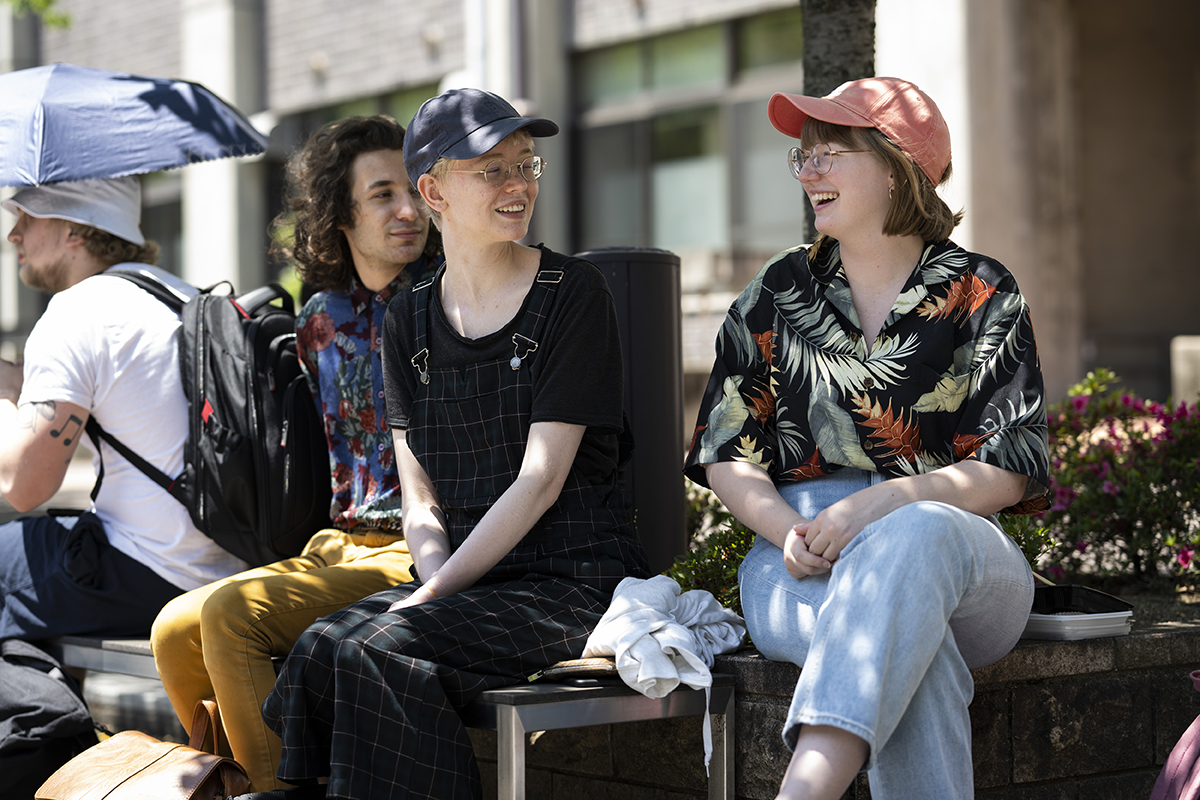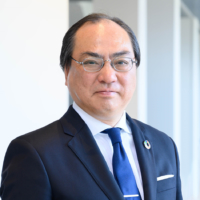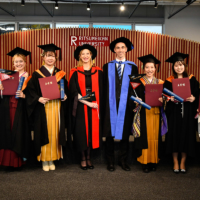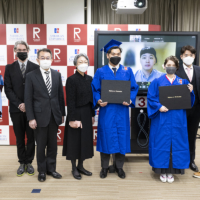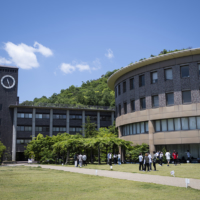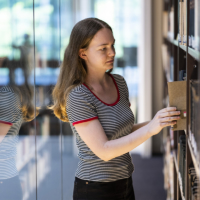“Challenge your mind, Change our future.” Ritsumeikan University adopted this motto in 2018 as part of its vision toward 2030. In a time when it is difficult to predict the future due to the COVID-19 pandemic and increasingly complex social and political issues, the university is determined to continue expanding its global education program, giving students and researchers the tools needed to take on new challenges.
“It’s important for universities of the future to contribute to solving social issues,” said Ritsumeikan University President Yoshio Nakatani. “The next generation of ‘research universities’ will be those that continue to promote such activities.”
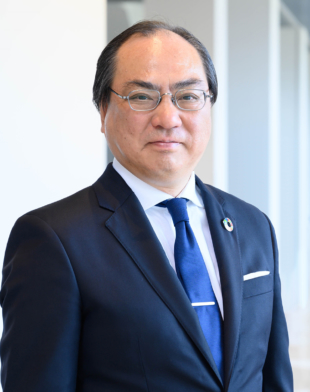
Nakatani noted that Ritsumeikan University has two central pillars. First, it is a next-generation research university and second, it fosters human resources capable of swift innovation. “Students who are nurtured at such a university will become people who have an impact on society. Students should look ahead to the future, challenge themselves to do various things and take action to create change through collaboration with others. It is these kinds of challenges that will change the world,” he added.
What is required today, Nakatani said, is a sensitivity to find new meaning in the world, and the accumulation of rich emotional experiences to support this new meaning. “Universities must continue to provide such opportunities through education and research,” he stressed.
The history of Ritsumeikan University goes back to 1869 when Prince Kinmochi Saionji, then a 20-year-old international statesman, founded the private academy Ritsumeikan on the site of the Kyoto Imperial Palace. In 1900, Kojuro Nakagawa, a former secretary of Saionji, established the Kyoto Hosei School (now Ritsumeikan School of Law and Politics), an evening law school for working people. The school formally adopted the name Ritsumeikan University in 1913 and was given university status in 1922.
The spirit of liberalism and internationalism advocated by Saionji was combined with the ideals of academic freedom and innovation pursued by Nakagawa, becoming a tradition of the academy. It is with this same freedom and enthusiasm toward innovation that students pursue their studies today.
The university celebrated the 150th year since the founding of Ritsumeikan and the 120th anniversary of the establishment of the Ritsumeikan Academy in 2020. The academy consists of Ritsumeikan University, and Ritsumeikan Asia Pacific University, and five affiliated schools: Ritsumeikan Primary School, Ritsumeikan Moriyama Junior and Senior High School, Ritsumeikan Junior and Senior High School, Ritsumeikan Uji Junior and Senior High School, and Ritsumeikan Keisho Junior and Senior High School.
Steps to internationalize
One of the first universities in Japan to achieve internationalization, Ritsumeikan University has implemented advanced initiatives through its flagship Joint Degree Program, which was established in 2018 in collaboration with American University in Washington D.C. It was the first joint degree undergraduate program between the United States and Japan. Additionally, a dual degree program was formed in 2019 in the university’s College of Global Liberal Arts in partnership with the Australian National University. The program allows students to earn two degrees, one from Ritsumeikan University in Osaka and the other from ANU, a center of international politics, following four years of study entirely in English.
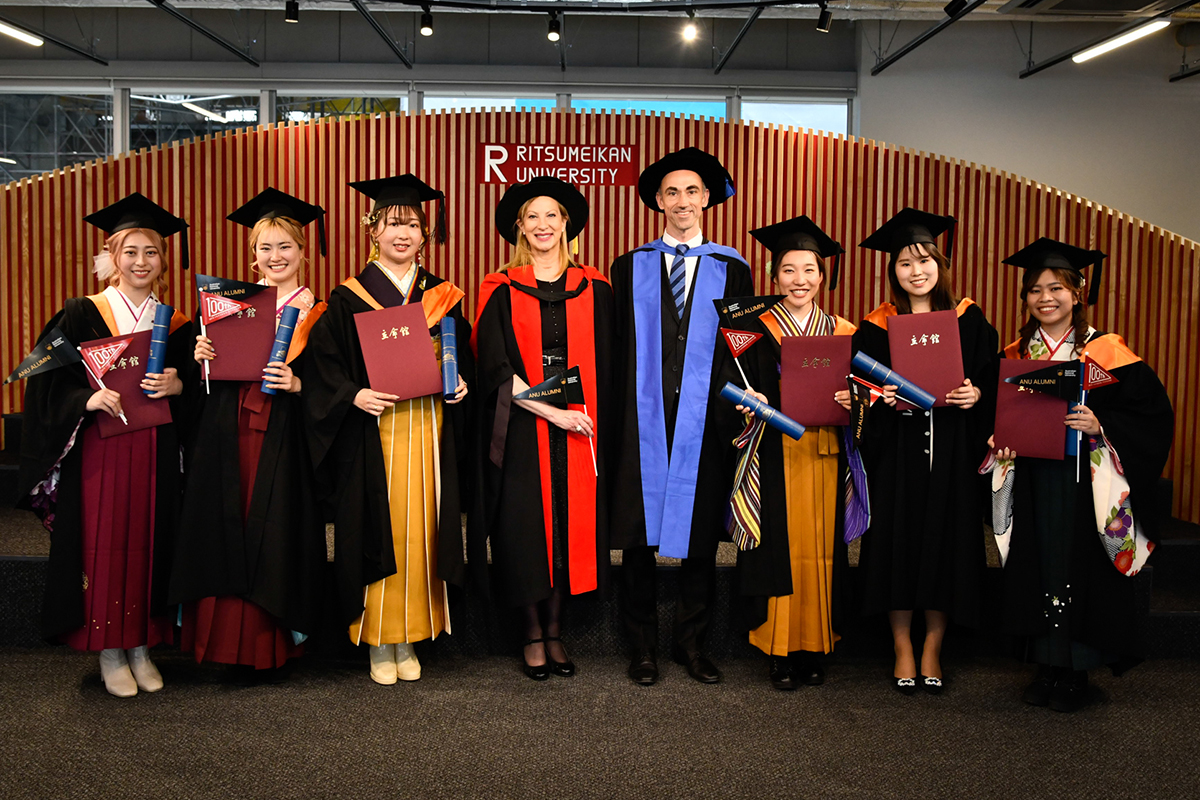
Ritsumeikan University has also established study abroad programs, such as the Global Fieldwork Project. With the aim of deepening understanding of global society, the program gives students the opportunity to experience different cultures and review their own values and ways of thinking while experiencing the unique aspects of foreign countries.
As such, the university has gone through three phases of internationalization, according to Nakatani.
In the first phase, from the end of the 1980s to the beginning of the 1990s, the university worked on the formation of an internationalization center oriented around the establishment of the College of International Relations in 1988. It was the first university in western Japan to have such a college.
In the second phase, from the end of the 1990s to the early 2000s, it promoted the development and maintenance of a university-wide international education program, including Ritsumeikan Asia Pacific University, which opened in 2000.
In the third phase, from the 2000s onward, all faculties at the university continue to promote internationalization of their educational content, and develop multilayered international education in conjunction with university-wide programs. In addition to regular courses, global education and exchange are also being promoted in extracurricular activities. Especially in the past decade, the university has seen remarkable internationalization, exemplified by the launch of the Joint Degree Program in 2019.
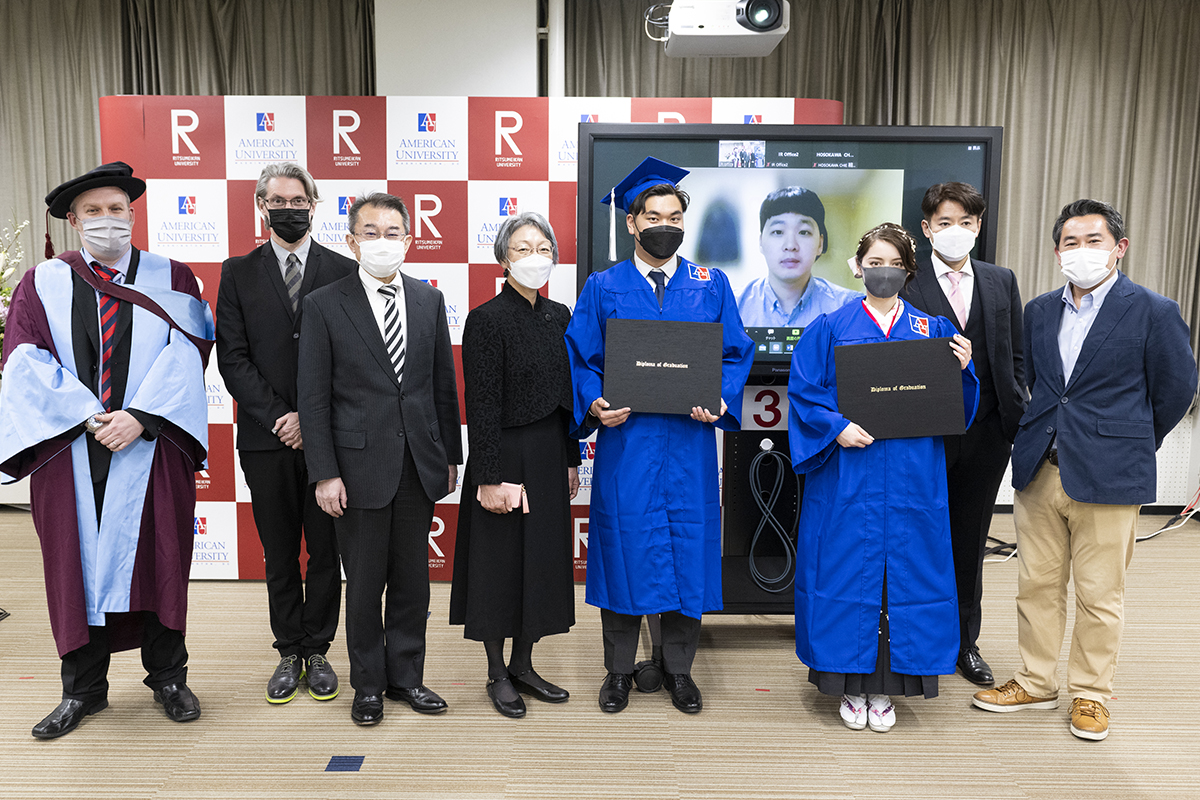
East Asian perspective
Among other distinctive international programs is the Campus Asia Program that started in 2012 as a study abroad program in both China and Korea. The program is part of the university’s College of Letters and Arts, where students learn about the history, culture and society of the three countries, including Japan, in the local language of each country. Students learn Chinese and Korean and basic knowledge in their first year, and study abroad in their second and third years when they take language courses and specialized courses such as history, culture and society in Guangzhou, China, and Pusan, South Korea. Using language as a tool, students acquire specialized knowledge that enables them to consider and analyze East Asia from a global perspective.
Through these studies, the university hopes that students will develop the ability to tackle not only East Asian issues, but also global issues that transcend national and regional boundaries. With the world’s problems becoming more diverse and complex, the university believes that building relationships with people with different backgrounds and values, and ultimately learning how to share those values, will serve as a major driving force in solving them.
Collaboration with Dalian
Ritsumeikan University has endeavored to collaborate with foreign universities not only in the liberal arts, but also in science and engineering. An international information technology school, Dalian University of Technology-Ritsumeikan University International School of Information Science and Engineering, was jointly established in April 2013 by the College of Information Science and Engineering at Ritsumeikan University and the School of Software at Dalian University of Technology in Dalian, China. It is the first joint establishment and operation of a faculty by a university based in Japan and the first such effort by a national university in China.
The faculty is located on the Dalian University of Technology campus under the Chinese Ministry of Education. Forty of the 210 students in the first academic year transfer to Ritsumeikan University in their third year and obtain degrees from both universities. The remaining students receive degrees from Dalian University of Technology. Most of the specialized courses are taught in Japanese by faculty members of the School of Information Science and Engineering at Ritsumeikan University.
Reaching the next level
In 2019, 2,416 foreign students were enrolled at Ritsumeikan University, and the number increased even in 2022 amid the COVID-19 crisis, with 2,604 enrolled.
“While many other universities have seen a smaller number of international students, Ritsumeikan University has seen an increase in the number,” Nakatani said.
The university has also started online exchanges between Japanese students and their foreign counterparts abroad. According to Nakatani, in a popular one-month program that started in 2021 between Ritsumeikan University and the University of California, Davis, in the United States, online discussions in English such as on the theme of the United Nations sustainable development goals have proved to be “incredibly effective” for students in not only developing their language skills but also attaining a global perspective.
In addition to collaborating with overseas universities, Ritsumeikan actively promotes international experiences to students on campus. In 2018, it opened the Beyond Borders Plaza , a program for global exchange and language learning, at each of its three campuses — the Kinugasa Campus, Biwako-Kusatsu Campus and the Osaka Ibaraki Campus. Student staff members are active at each campus, holding cross-cultural exchanges, themed workshops and other events unique to the global commons.
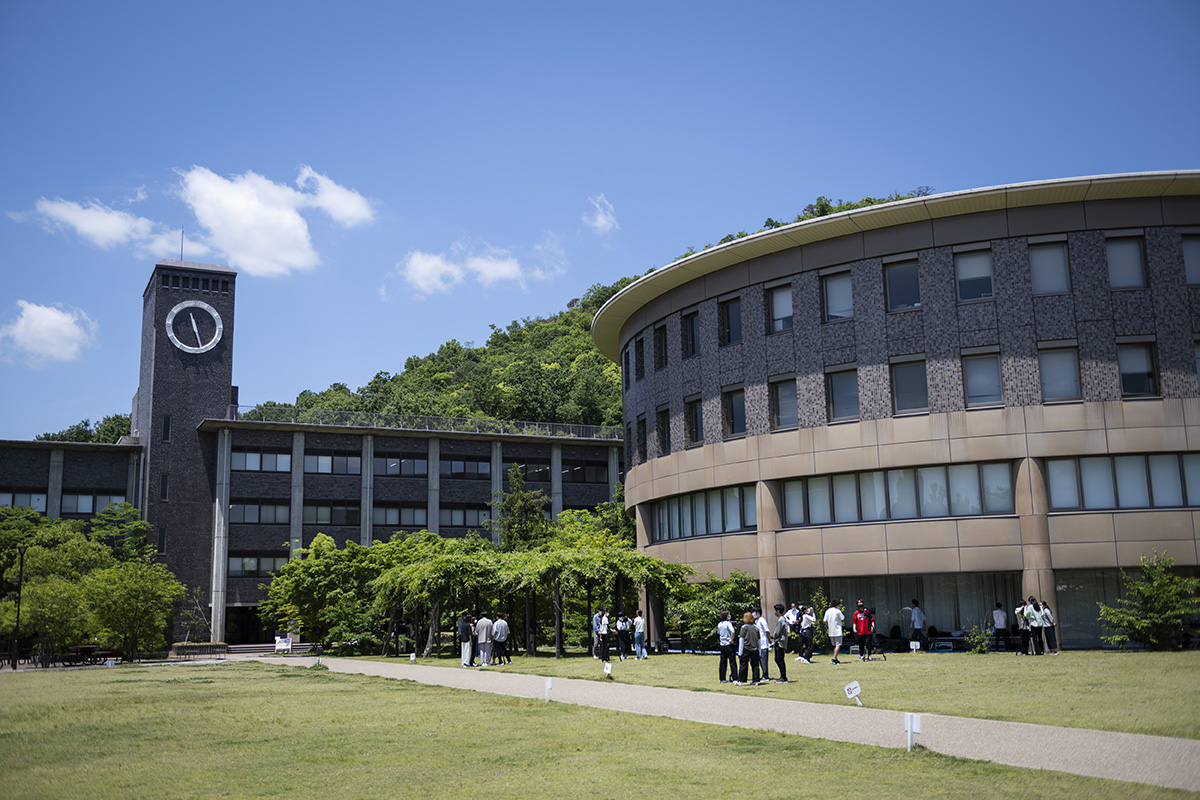
Now, Nakatani would like to expand the program from on campus and online to real study abroad programs so that the English language would be brought naturally to “the everyday lives of the students.”
The university wants to bring itself to a new level of not just internationalization, but also diversity. “The university has emphasized diversity since its founding. An example of diversity is that more than half of the students are from outside the Kinki region, where the university is based,” Nakatani said. “The founding spirit of the school is based on freedom and progress. Because we are free, we are diverse, and because we are diverse, we are free.”
With such a mindset, plans are underway by the university to build a space-related research center in the summer of 2023 at its Biwako-Kusatsu Campus. “Various analytical techniques and resources will be explored there,” Nakatani said, adding that the university will bring in international human resources and knowledge to the research center.
Career success
Through its various international programs, Ritsumeikan University does its utmost to cultivate globally minded students who can take on active roles in a variety of international fields and settings. Nakatani pointed out that many graduates have gone on to work at international organizations such as the Japan External Trade Organization, and that others have succeeded at a variety of well-known global firms. “A female graduate is now the vice president of Robert Bosch in Japan, a leading global supplier of technology and services,” Nakatani said. The university aims to continue fostering such human resources who can communicate with people around the world.
Unique character
Ritsumeikan University is unique among universities in that the Ritsumeikan Academy that it is part of offers an “integrated education” consisting of a three-stage education program from elementary to high school, with the third stage preparing students for higher education and career-related activities.
“We have created a very clear and consistent education system where there is one vertical flow, moving from exploration to research,” Nakatani said.
This uniqueness may have been a leading factor in the university achieving high levels in university rankings. It was ranked third for the second consecutive year among private universities in Japan in the QS World University Rankings 2023, and 201st to 300th overall globally. It also placed at the top among private universities in western Japan in the Times Higher Education Impact Rankings 2022, which evaluates universities’ level of commitment to achieving the SDGs through research and social contribution activities.
As a leading institution in Japan, Ritsumeikan will continue to make efforts to flourish in all areas of academia, with an eye toward producing graduates who can contribute to global society at all levels.

This page is sponsored by Ritsumeikan University.
Ritsumeikan University
Address: 1 Nishinokyo-Suzaku-cho, Nakagyo-ku, Kyoto-shi 604-8520, Japan
Tel: +81-75-813-8146
URL: https://en.ritsumei.ac.jp



